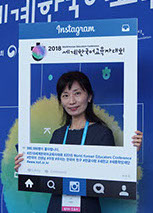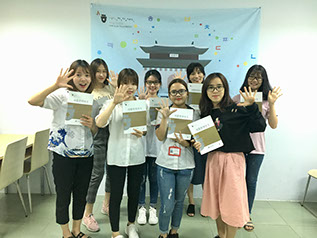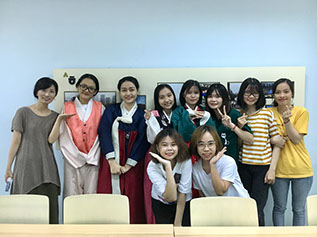
Stories of KSI People
Ho Chi Minh 3 KSI, Vietnam
Han-ji Lee, teacher & manager

 Could you introduce yourself and your institute?
Could you introduce yourself and your institute?
I’m Han-ji Lee and I work as a manager and a teacher at Ho Chi Minh 3 KSI. I used to work as a science teacher for Koreans living in China. However, I’ve been working here since Ho Chi Minh 3 KSI opened in 2014. Our King Sejong Institute is the third branch to be established in Ho Chi Minh City. It’s co-managed by Kyungwoon University and Industrial University of Ho Chi Minh City. It’s located in campus but it’s in the outskirts of Ho Chi Minh City so traffic facilities and Internet environment are not great. We started with 40 students in 2015 and now we have 500 students annually.
 Please share major strengths of Ho Chi Minh 3 KSI.
Please share major strengths of Ho Chi Minh 3 KSI.
Ho Chi Minh 3 KSI expanded greatly within such a short period. It was possible because all the staffs have been collaborating closely. Though it’s been only three years since it opened, we held 32 lectures on Korean language and culture, and a total of 17 cultural events just within last year. As a result, our head of the institute, Seon-ha Lee, was awarded Minister prize from Ministry of Culture, Sports and Tourism in 2017. Also Nguyen Thien Tue, president of Industrial University of Ho Chi Minh City, has been awarded the same prize this year. We plan to work together in order to further develop Ho Chi Minh 3 KSI as an organization spreading Korean language and culture.
 What are the areas to be improved at your institute?
What are the areas to be improved at your institute?
Classrooms of the institute are limited. There are a lot of people who want to learn Korean but we cannot accommodate all. Each semester we have about 100 applicants who are on a waiting list. We plan to request Industrial University of Ho Chi Minh City for more classrooms. Also, another issue is that 95% of our learners are from the students from the university. Due to its regulations, it’s rather difficult for outsiders to access the campus. Consequently, only the university students attend the classes at our institute. We plan to negotiate with the university to seek ways for the general public to attend the courses at KSI.
 What are the areas that you consider the most while teaching Vietnamese students?
What are the areas that you consider the most while teaching Vietnamese students?
Vietnamese language has similar characteristics as Korean and English. So learners grasp Korean language relatively easily. Above all, they tend to understand Sino-Korean words easily as both languages are influenced by Chinese characters. However, pronunciation of Vietnamese and Korean is different so I pay special attention to correct pronunciation of the learners.
 What is the most popular cultural event among students (or general public)?
What is the most popular cultural event among students (or general public)?
Almost every month, our institute hosts a Korean cultural event and the most popular one is Korean traditional wedding ceremony. Students love it as they can try on Korean traditional wedding costumes and experience an actual ceremony. Additionally, we always have a high level of satisfaction for Korean food events where people can actually cook and enjoy stir-fried rice cake, bulgogi, and japchae.
 What is the major goal of the institute this year?
What is the major goal of the institute this year?
This year, we aim to provide diverse Korean language and culture classes for our students. Our institute held a total of 40 classes. For the first time, we have opened all classes from ‘Sejong Korean 1’ to ‘Sejong Korean 6.’ Students who used to attend ‘Sejong Korean 1~2’ have improved so much and now they are attending ‘Sejong Korean 6.’ I feel so proud. Also we have launched courses of ‘Topic 1~2,’ ‘Sejong Korean Culture1~2’ and ‘Sejong Korean Conversation 4A.’ We not only provide Korean culture classes but also diverse Korean language classes at different levels with different study purposes.
 When is the moment that makes you feel that you’ve made the right choice to work at KSI’?
When is the moment that makes you feel that you’ve made the right choice to work at KSI’?
This job is so appealing. I used to teach science back in Korea and China but now it’s a lot different. Just communicating with my Vietnamese students at KSI is an immense rewarding experience. Especially, my students bring back regional products from their hometown when they come back from a holiday. They would say, “Please have some, teacher,” and give me a handful of gifts from their hometown. Also I feel rewarded when my students leave me a letter with their own writing. Though they are written with poor grammar and vocabulary, I truly enjoy reading them.
Recently, I had to visit Korea due to the loss of a family member. When I returned here, my desk was filled with notes of condolences and supportive messages. I was really touched. Generally, Vietnamese teachers tend to be authoritative and harsh. On the other hand, teachers at KSI are very friendly, and students feel at ease and really like us.
 How do you foresee Ho Chi Minh 3 KSI in 10 years from now?
How do you foresee Ho Chi Minh 3 KSI in 10 years from now?
After 10 years, I hope that we would be equipped with everything that we are desperately in need of at the moment. The top priority is the space for the institute. I hope we can use an entire building of Industrial University of Ho Chi Minh City. I dream of a building with classrooms, a computer room, a culture experience hall, a kitchen and a dance studio with a mirror wall. So one day, our KSI students can learn and enjoy Korean language and culture to the fullest. In fact, the university is currently in the process of building its second campus, so I guess it’s not a far-fetched dream.
Person
of
October


No.64 | October, 2018
